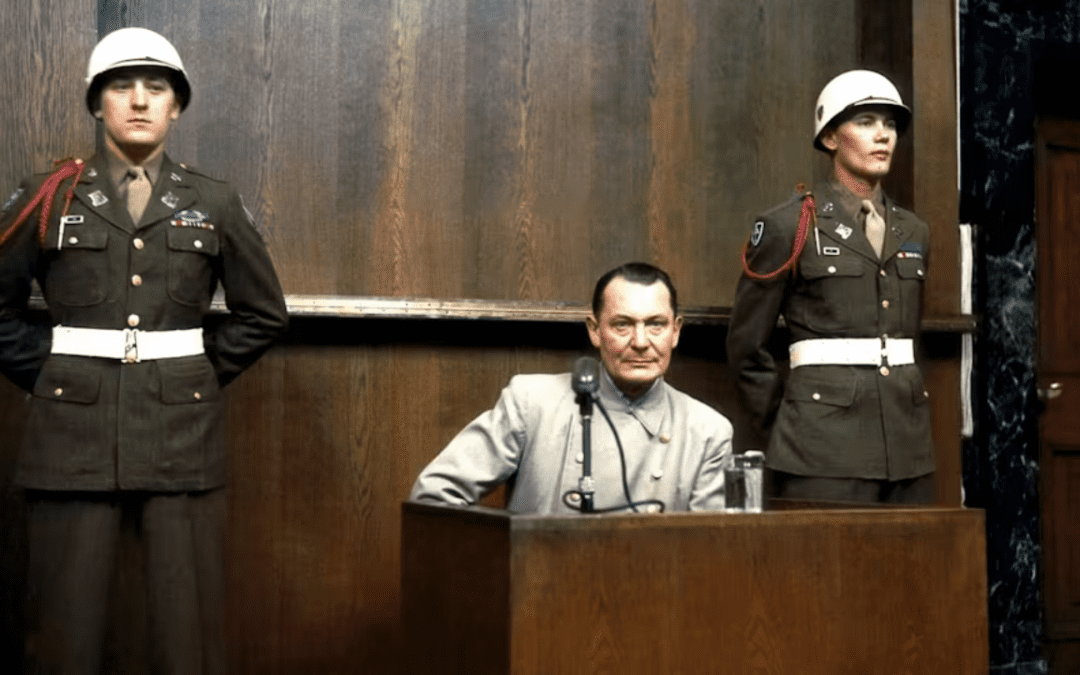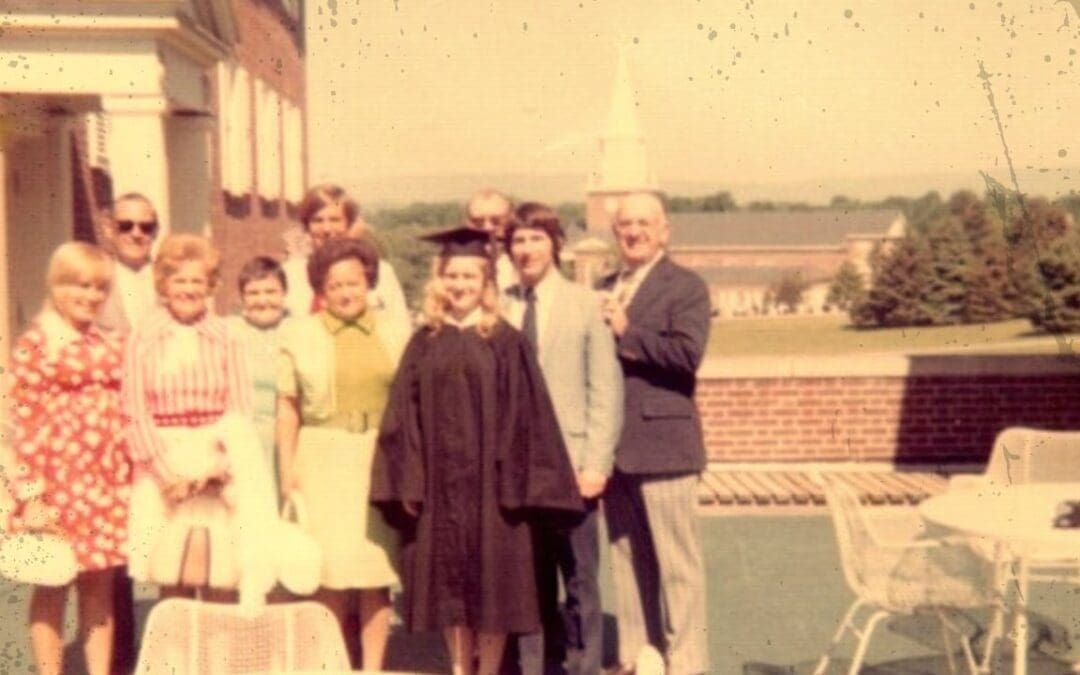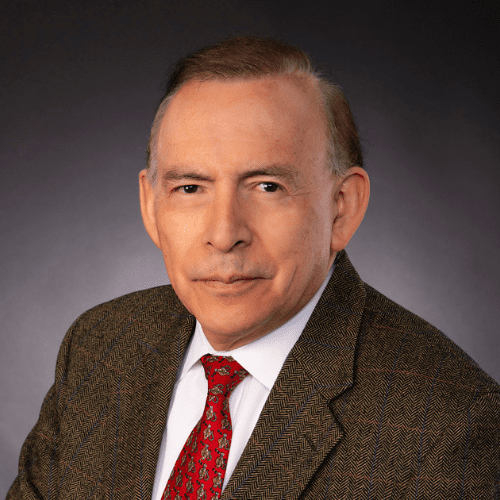
by Donna Park | Dec 19, 2025 | Peace
Given my long-term interest in international affairs, I went to see the recently released movie, “Nuremberg,” to revisit the issue of how a court of law can be used to convict those guilty of war crimes. As a result, several parts of the film left me uneasy and looking for a better way to govern our world.
A statement in the film made by Hermann Goering, one of the most powerful leaders of Germany’s Nazi Party from 1933 to 1945, particularly struck me. He told the American psychologist whose job was to get to know him and keep him alive for the trial: “I am a prisoner because you won and we lost, not because you’re morally superior.” Goering suggested that if the Germans won the war, the Americans could have been brought to trial for dropping two nuclear bombs on Japan in August 1945.
Although, of course, Goering was a monster, his suggestion that the war’s victors were also responsible for war crimes has a disturbing element of truth to it. According to the K=1 Project, Center for Nuclear Studies at Columbia University, within the first few months after the bombing between 150,000 and 246,000 people, most of whom were civilians, died in Hiroshima and Nagasaki due to the force and excruciating heat of the explosions as well as deaths caused by acute radiation exposure.
Indeed, the preparations for the Nuremberg war crimes trials were closely interwoven with the atomic bombings. The London Charter that created the International Military Tribunal for the prosecution of Nazi war criminals was signed on August 8, 1945―two days after the atomic bombing of Hiroshima and one day before the atomic bombing of Nagasaki.
It’s also worth pondering what would have happened to the war crimes trials of Nazi leaders if the four major Allied powers―the United States, the United Kingdom, France, and the Soviet Union—had not all agreed to them. Would the trials have occurred at all?
In fact, the world lacked an institutional structure to hold an individual accountable for war crimes until the Rome Statute, an international treaty, was adopted at the Rome Conference on July 17, 1998. Effective beginning July 1, 2002, the Rome Statute created the International Criminal Court (ICC). According to its website, the ICC “investigates and, where warranted, tries individuals charged with the gravest crimes of concern to the international community: genocide, war crimes, crimes against humanity and the crime of aggression. As a court of last resort, it seeks to complement, not replace, national Courts.”
Despite this breakthrough, the ICC is facing serious difficulties. Only 125 nations have ratified the Rome Statute, with the non-signers including China, Russia, Israel, India, Iran, and the United States. Furthermore, the U.S. government, under the presidency of Donald Trump, has recently imposed damaging economic sanctions against several members of the ICC. Meanwhile, Vladimir Putin has refused to surrender to the ICC for investigation of war crimes, while Benjamin Netanyahu has refused to submit to the court’s authority in connection with war crimes and crimes against humanity.
Holding individuals accountable for the gravest crimes should be a high priority of our world. We should not accept a world in which individuals can commit genocide, war crimes, crimes against humanity, and the crime of aggression with impunity. But officials of major powers continue to obstruct the operations of the ICC and to act with impunity.
How can we move forward to creating a world in which international law and its obligations receive proper respect?
We can do so by looking back to San Francisco and the promises made there in 1945 during the creation of the United Nations (UN). As World War II was ending, representatives of 50 countries gathered in that city from April 25 to June 26 to draft and sign a Charter for the UN in the hopes of fostering international security and preventing another world war. There were many compromises made in the initial Charter, the biggest being the veto in the Security Council granted to the 5 permanent members. But this veto was balanced with a promise to revisit the Charter in no more than 10 years.
Accordingly, Article 109, paragraph three of the Charter promised a vote in the UN General Assembly by 1955 on whether to hold a conference for all member states to review the Charter. This decision only requires a majority vote of the 193 members of the General Assembly and any seven members of the 15-member states in the Security Council. There is no possibility of a veto in connection with this vote, so it can pass even if all five permanent members oppose the conference.
Unfortunately, no such vote has ever been taken at the General Assembly. We are now 70 years past the promised date. The multi-dimensional crises facing our world, including our inability to hold individuals accountable for the gravest crimes against humanity, demand such a vote, followed by the strengthening of the UN Charter and the international law it is supposed to enforce. Our world should be governed using the rule of law, not military might.
The recently formed Article 109 Coalition is now working towards a conference to review and strengthen the UN Charter. Concerned Americans should learn more about it and take action to support it. There is a better way to govern our world and to keep humanity safe and secure from military threats and crimes against humanity. Let’s move forward with it!

by Donna Park | Mar 11, 2025 | World Federation
I used to be proud of being a citizen of the United States of America. My parents were part of what has been called the “Greatest Generation.” My dad served in England in the Army Air Corps during World War II, and I was raised to be proud of the many Americans who gave their lives in defense of democracy.
I also was proud that the United States played a major role at the United Nations (U.N.). At the U.N., the U.S. government joined with other nations to help poorer countries combat hunger and disease. That was also part of supporting democracy and, more broadly, supporting human rights.
I know that the U.S. government hasn’t always lived up to its ideals. It has overthrown democratically elected governments and replaced them with authoritarians who promised to be pro-American. But, in many cases, it did the right thing, helping nations and people who were less fortunate. At its best, the United States had a strong moral compass.
The Trump administration has made it clear that the U.S. government is no longer interested in doing the right thing. Now it is only concerned about “America First,” and it is also a very narrow view of what is good for America.
According to an article by Margaret Besheer, who has long covered the U.N. for the Voice of America, the U.S. government made it clear during a vote at the U.N. General Assembly that it will no longer reliably support the U.N. global sustainable development goals (SDGs). The SDGs, adopted by all U.N. Member States in 2015, are an urgent call for action by all countries working together to end poverty, improve health and education, reduce inequality, and spur economic growth while tackling climate change.
On March 4, the U.S. government voted against a resolution titled “International Day of Peaceful Coexistence” that reaffirmed the 2030 Agenda for Sustainable Development. U.S. representative Edward Heartney explained that the Presidential election was a vote by Americans to refocus on U.S. interests stating: “Simply put, the globalist endeavors like the 2030 Agenda and the SDGs lost at the ballot box.” The U.S. vote didn’t change the outcome, for the resolution passed 162 to 3, with the US voting “No” along with Israel and Argentina.
But that isn’t all the U.S. government opposed at the U.N.. Besheer goes on to say: “’The General Assembly creates ‘International Days’ to raise awareness of important global issues and promote peace and tolerance. On Tuesday, delegates voted to create an ‘International Day of Hope,’ as well as an ‘International Day for Judicial Well-Being.’”
Washington stood alone, the sole no vote on both. The United States was also the only country to vote against a resolution “Education for Democracy,” which affirms “the right of everyone to education” and highlights “the importance of equal opportunities for young people, including women.” We stand alone in the world, voting against hope, judicial well-being, and education for democracy.
Although the General Assembly doesn’t have the ability to create international law, it does have a moral authority, based on its representation of virtually all nations of the world. By contrast, thanks to the new U.S. administration, the United States will no longer help create the world’s moral compass.
And to make matters worse, we might be withdrawing from the World Health Organization (WHO), the U.N. Human Rights Council (UNHRC), the U.N. Educational Scientific and Cultural Organization (UNESCO), and more international organizations based on recent Executive Orders.
We live on a small planet that is facing multiple global crises including war, pandemics, hunger, poverty, human rights abuses, climate chaos, and the threat of nuclear destruction. The United States is not immune to these global crises.
Citizens for Global Solutions advocates that the best way to protect America and the world is to improve the way the world is governed―not turn our back on the world and our allies, not throw away our moral compass. CGS works to transform the U.N. from a loose confederation of nations to a democratic federation of nations based on the rule of law, much the way the United States transitioned to a federation when we created our constitution.
CGS had envisioned that the United States would be a leader in this transformation. But, given recent events, it now looks increasingly like we are going to need to rely on others with a stronger moral compass to lead the way.

by Donna Park | Jul 12, 2024 | Peace
Although I am now a mother and grandmother, when I was in college in the early 1970s I protested against the Vietnam War. Thankfully, all the protests I joined stayed peaceful. I was lucky I wasn’t at Kent State University, where, on May 4, 1970, four unarmed student protesters were shot and killed and another 9 were wounded by the Ohio National Guard, which had opened fire on them with high-powered rifles.
Even though the demonstrations in which I participated were peaceful, we were often told we were “anti-American” if we were against war. “Love it or leave it,” we were told. My dad was a veteran of World War II. He wasn’t happy with my participation in the protests, and he was especially upset when I wrote a letter to the editor of my hometown newspaper, publicly stating I was against the war. Indeed, he threatened to pull me out of college.
But my friends and I were not anti-American. We were anti-war…and many of us still are. I love America, but I do not love the war machine that makes some people wealthy while causing widespread death, suffering, and environmental disasters. I am against war, but still insist we care for our veterans who are injured physically and emotionally by war.
The traditional argument for war is that it makes us safe and secure. But it is hard to see how any war in this century has made us either safe or more secure. One could even argue that wars are making us less secure by creating more enemies. In my opinion, we need more Americans standing up and saying we are against war and need to find a better way to make us safe and secure.
So I am proud of the college students who have protested peacefully against the war in Gaza. Just as I was called anti-American in the 1970s, many of them are being called anti-Semitic 50 years later. I believe the vast majority of them are not anti-Semitic but, rather, are anti-war, against the killing of civilians (especially children), and opposed to the destruction of people’s homes and hospitals. In fact, there are many Jewish students who are protesting the war. Some of them are facing harsh criticism from their parents for failing to defend the state of Israel. I applaud these students for holding onto their convictions that war and killing are wrong, even in the face of criticism from home.
I would like to encourage today’s students―and people in general― to promote an alternative way to solve the conflicts among nations that sometimes lead to wars. Within the United States, we avoid violence and wars among our states by relying on judicial action to resolve disputes. The same peaceful settlement of disputes is possible on the international level through the International Court of Justice (ICJ), the principal judicial organ of the United Nations.
Currently, though, only 74 nations accept the compulsory jurisdiction of the ICJ. Legal Alternatives to War (LAW Not War) is a recently-launched global campaign to extend this Court’s jurisdiction. The principal objective of the campaign is to increase the number of States accepting the compulsory jurisdiction of the ICJ, with the goal of achieving universal acceptance of jurisdiction by 2045, the 100th anniversary of the United Nations. In addition, the campaign works to enhance ICJ jurisdiction by promoting greater use by UN bodies of the option to request Advisory Opinions from the ICJ, such as the current requests for opinions on State responsibility for climate change, and encouraging disputing States to make more frequent use of the option of taking cases to the ICJ by mutual agreement.
Relying on the force of law instead of the law of force is a better way to address conflicts among nations and, in this fashion, keep us all safe and secure.

by Donna Park | Oct 9, 2022 | World Federation
I am a grandmother, and I have a dream that grandparents will work with their grandchildren to unite the world and build a better future.
But first we need to have a vision of how the world could be improved.
Many global problems face the world today
There are many problems facing the world today, including war and the threat of nuclear destruction, climate change, human rights abuses, hunger, extreme poverty, growing income inequality, and global pandemics. One central source of our global problems is that we have put nations above people. I think we should put people first. National sovereignty and security should not be more important that the sovereignty and security of individuals. Governments should be protecting the rights and freedoms of their people, not sacrificing them.
War is one way in which nations sacrifice their people rather than protect them. War kills and injures people. War destroys the environment. War robs us of our financial and natural resources War does not bring peace, although it does make a lot of money for some.
Think creatively to eliminate war
Surely it is time to think creatively about eliminating war. Here in the United States, we can look to our own history for a way to accomplish that. When Americans decided to transform the confederation of 13 colonies into a federation of states, they agreed to resolve their differences in a court of law rather than on the battlefield. The original 13 states were able to eliminate or transform their militias. With no need any longer to fight one another, they could rely on the rule of law to settle disputes. Although the rule of law is not perfect, it is the best method we have found. And it is preferable to war.
We need a similar transformation at the global level. Why not transform the confederation of nations known as the United Nations into a United Federation of Nations? Under this strengthened UN system, all nations could agree to resolve their differences using the rule of law rather than weapons of destruction. Nations could be required to disarm and to transform their armed forces into peacekeeping forces that would respond to natural disasters and other domestic crises.
Unite the World
To implement this program, we could start by creating a World Parliament at the United Nations to give a voice to the people of the world, rather than just their governments. We also need a world constitution to define a democratic federation of nations with a universal declaration of human rights and the ability to create and enforce world law that outlaws war and nuclear weapons. Furthermore, we will need international courts (such as the International Criminal Court) and international police to arrest those who break the law. Fortunately, much work has been done defining these components over the past 75 years.
All these components will cost much less than the vast amounts spent on the current war systems. Furthermore, a United Federation of Nations could be employed to deal effectively with other global problems, such as climate change.
This vision is shared by the Young World Federalists. Their tag line is “Unite the World.” As their website explains, they are “a global movement to unite humanity through the creation of a democratic world federation.” They believe that the current system of competitive sovereign countries fails to tackle the global challenges that impact us all. Accordingly, they advocate a new form of global governance, one in which people cooperate to secure their common interest through a democratic world federation. They envision a sustainable, just, and peaceful world through a democratic world federation. It would be a world run by humanity, for humanity, providing equal opportunity to all on a thriving planet.
Work across the generations
The Young World Federalists (YWF) are building on the work of well-established organizations such as Citizens for Global Solutions (CGS). CGS was founded 75 years ago, and many of its supporters, like me, are grandparents of the Young World Federalists’ generation. We are delighted to be working with these young people and, in fact, have a lot to learn from them in this modern era of social media and technology. We also have a lot to share with them, including our knowledge, experience, and funding. One of their programs that we are co-sponsoring is the Week for World Parliament, which includes an event in New York City on October 22-23.
Working together, young and old, we are committed to building a united world and a better future for all.






























